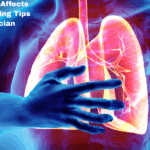
Getting enough sleep is essential for preserving general health and wellbeing. However, for millions of individuals worldwide, disrupted sleep becomes more than just an occasional nuisance—it can become a chronic condition with far-reaching consequences. One of the most common sleep disorders is sleep apnea, which can have profound effects on both physical and mental health if left undiagnosed and untreated.
What Is Sleep Apnea?
A sleep disorder called sleep apnea is typified by frequent breathing pauses while you’re asleep. These interruptions, also called apneas, can last anywhere from a few seconds to minutes and may occur multiple times throughout the night. Sleep apnea leads to a significant drop in oxygen levels in the blood, which can strain the cardiovascular system and disrupt restorative sleep.
Sleep apnea comes in three primary forms:
- Obstructive Sleep Apnea (OSA): Caused by a physical blockage in the airway, such as excess fat around the neck or enlarged tonsils.
- Central Sleep Apnea (CSA): A neurological issue where the brain fails to send proper signals to the muscles controlling breathing.
- Complex Sleep Apnea Syndrome (also known as mixed sleep apnea): A combination of OSA and CSA.
Sleep apnea can affect anyone, but certain risk factors like obesity, smoking, family history, nasal congestion, or having a large neck circumference may increase your likelihood of developing the condition.
Early diagnosis and treatment are crucial, as sleep apnea can lead to numerous health complications over time.
Physical Health Effects of Sleep Apnea
Sleep apnea can significantly impact the body by affecting vital organ systems. It not only compromises sleep quality but can also lead to chronic diseases and other serious health issues.
1. Cardiovascular Diseases
One of the most common physical health effects of sleep apnea is its impact on the cardiovascular system. Repeated pauses in breathing during sleep put added stress on the heart and blood vessels. This can lead to:
- High Blood Pressure (Hypertension): The strain caused by low oxygen levels leads to elevated blood pressure.
- Heart Attacks: Disrupted breathing can cause changes in heart rate, increasing the risk of heart attacks.
- Stroke: Sleep apnea can also increase the risk of ischemic stroke due to a lack of proper oxygenation to the brain.
These hazards can be considerably decreased by early detection and treatment of sleep apnea.
2. Diabetes and Metabolic Syndrome
The connection between sleep apnea and metabolic health has been well established. When breathing is repeatedly interrupted during sleep, the body struggles to maintain normal glucose levels. This leads to insulin resistance, which can progress to type 2 diabetes. Additionally, the hormonal changes caused by sleep apnea can impair the body’s ability to regulate hunger and metabolism, which can lead to weight gain and metabolic complications.
If you struggle with diabetes or obesity, addressing sleep apnea can help you manage these conditions more effectively.
3. Weight Gain & Obesity
Obesity is both a cause and an effect of sleep apnea. People with sleep apnea tend to struggle with weight management for several reasons:
- Sleep disruption affects the hormones that regulate hunger, leading to overeating.
- Poor sleep decreases physical activity levels, reducing the body’s ability to burn calories effectively.
Addressing weight and lifestyle through diet and exercise, along with treating sleep apnea, can improve overall health.
4. Respiratory Issues
Sleep apnea disrupts normal breathing, which can lead to problems with the lungs and other respiratory pathways. Individuals with chronic respiratory conditions like asthma or chronic bronchitis may find these symptoms exacerbated if they also suffer from sleep apnea.
Sleep apnea weakens the body’s ability to regulate breathing during the night, leading to increased susceptibility to other lung-related complications.
Mental Health Effects of Sleep Apnea
While the physical effects of sleep apnea are concerning, its impact on mental health can be just as devastating. Cognitive and emotional problems might result from sleep disruption, persistent exhaustion, and low oxygen levels when you sleep.
1. Depression and Anxiety
Sleep apnea and mental health are closely connected. Chronic sleep deprivation caused by repeated breathing interruptions can lead to mood disorders such as depression and anxiety. Lack of proper rest affects neurotransmitter balance, making it harder for the brain to regulate mood.
Many individuals with sleep apnea report feelings of sadness, irritability, and worry, which can escalate into severe mental health challenges if untreated.
2. Cognitive Impairment
Sleep is essential for brain function. Sleep apnea deprives the brain of the restorative effects of uninterrupted sleep, leading to cognitive decline. Common symptoms of cognitive dysfunction associated with sleep apnea include:
- Memory problems
- Difficulty focusing
- Lack of mental clarity (often referred to as “brain fog”)
These cognitive effects impair everyday tasks, work performance, and decision-making abilities.
3. Daytime Sleepiness & Reduced Quality of Life
Excessive daytime sleepiness is one of the most obvious effects of untreated sleep apnea. Individuals may feel excessively tired, struggle to stay awake during the day, and face reduced productivity in personal and professional life.
Sleep apnea-related fatigue can negatively affect relationships, as partners or family members may also struggle due to disrupted sleep.
The Importance of Early Diagnosis & Treatment
The effects of sleep apnea on physical and mental health are serious, but they can be prevented or managed with early diagnosis and proper treatment. Common treatments for sleep apnea include:
- CPAP Therapy: This therapy uses a continuous flow of air to keep the airways open during sleep.
- Lifestyle Changes: Weight loss, quitting smoking, regular physical activity, and dietary adjustments.
- Surgical Treatments: Surgical options can address anatomical blockages in the airway.
Early intervention through professional guidance can provide customized treatment plans to reduce complications and improve quality of life.
Summary
Sleep apnea is a complex condition with widespread effects on both physical and mental health. From cardiovascular diseases and diabetes to cognitive impairment and mood disorders, the impact of untreated sleep apnea extends far beyond disrupted sleep.
Recognizing the symptoms of sleep apnea and seeking professional care is essential for early diagnosis and effective treatment. If you notice signs such as loud snoring, daytime sleepiness, or frequent night awakenings, consult a sleep specialist to reclaim better health and improved sleep quality.
For expert diagnosis and treatment, Dr. Yogesh Agrawal, a highly skilled sleep specialist based in Wakad, Pune, is available to provide guidance and support in managing sleep apnea and its effects.




